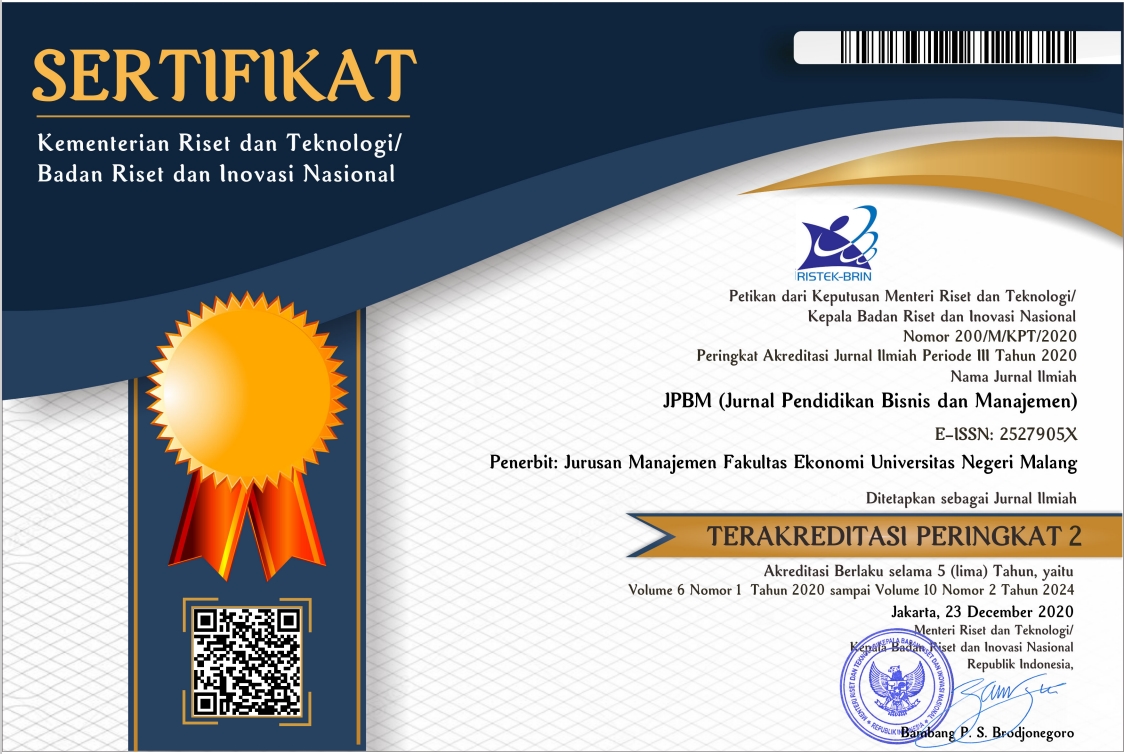Opportunity Recognition and Green Entrepreneurial Intention: The Moderating Effect of Entrepreneurship Education
Abstract
Increasing the entrepreneurial intentions of university students a being crucial issue. The purpose of this study was to determine the effect and analyze the moderator of entrepreneurship education on the relationship between opportunity recognition and green entrepreneurial intentions. This research applied an explanatory survey and questionnaires distributed to 195 students of Economic Education Siliwangi University in Tasikmalaya. The collected data were analyzed using structural equation modeling (SEM). The results in this study show that opportunity recognition positively impacts students’ green entrepreneurial intention. This study also indicates the role of entrepreneurship education in moderating the relationship between opportunity recognition and green entrepreneurial intention. The implication of the research is to support the formulation of entrepreneurial education initiative that can promote students in entrepreneurial projects either in the present or in the future.
Keywords: Entrepreneurship Education, Green Entrepreneurial Intention, Opportunity Recognition.
Full Text:
PDFReferences
Al-Jubari, I., Hassan, A., & Liñán, F. (2019). Entrepreneurial intention among University students in Malaysia: integrating self-determination theory and the theory of planned behavior. International Entrepreneurship and Management Journal, 15(4), 1323–1342. https://doi.org/10.1007/s11365-018-0529-0
Anwar, I., Jamal, M. T., Saleem, I., & Thoudam, P. (2021). Traits and entrepreneurial intention: testing the mediating role of entrepreneurial attitude and self-efficacy. J. for International Business and Entrepreneurship Development, 13(1), 40. https://doi.org/10.1504/JIBED.2021.112276
Arenius, P., & Clercq, D. De. (2005). A network-based approach on opportunity recognition. Small Business Economics, 24(3), 249–265. https://doi.org/10.1007/s11187-005-1988-6
Arikunto, S. (2013). Prosedur penelitian: Suatu pendekatan praktik. Jakarta: Rineka Cipta.
Asih, W. M., Kamil, I., & Indrapriyatna, A. S. (2020). Peran pendidikan kewirausahaan terhadap perilaku inovatif mahasiswa dalam menghadapi revolusi industri 4.0. JMKSP (Jurnal Manajemen, Kepemimpinan, Dan Supervisi Pendidikan), 5(1), 31. https://doi.org/10.31851/jmksp.v5i1.3513
Astriani, V., & Nooraeni, R. (2020). Determinan Pengangguran lulusan perguruan tinggi di Indonesia Tahun 2018. Jurnal Pendidikan Ekonomi (JUPE), 8(1), 31–37. https://doi.org/10.26740/jupe.v8n1.p31-37
Ataman, K., Mayowa, J.-O., Senkan, E., & Olusola, A. M. (2018). Green entrepreneurship: An opportunity for entrepreneurial development in Nigeria. Covenant Journal of Entrepreneurship (Special Edition), 1(1).
Baručić, A., & Umihanić, B. (2016). Entrepreneurship education as a factor of entrepreneurial opportunity recognition for starting a new business. Management : Journal of Contemporary Management Issues, 21(2), 27–44.
Camelo-Ordaz, C., Diánez-González, J. P., & Ruiz-Navarro, J. (2016). The influence of gender on entrepreneurial intention: The mediating role of perceptual factors. BRQ Business Research Quarterly, 19(4), 261–277. https://doi.org/10.1016/j.brq.2016.03.001
Cliff, J. E., Jennings, P. D., & Greenwood, R. (2006). New to the game and questioning the rules: The experiences and beliefs of founders who start imitative versus innovative firms. Journal of Business Venturing, 21(5), 633–663. https://doi.org/10.1016/j.jbusvent.2005.02.010
Cooper, S. Y., & Park, J. S. (2008). The Impact of `incubator’ organizations on opportunity recognition and technology innovation in new, entrepreneurial high-technology ventures. International Small Business Journal: Researching Entrepreneurship, 26(1), 27–56. https://doi.org/10.1177/0266242607084658
Doğan, E. (2016). The Effect of entrepreneurship education on entrepreneurial intentions of university students in Turkey. Istanbul University Econometrics and Statistics E-Journal, 79–93. dergipark.org.tr/en/pub/iuekois/issue/27283/287198
Ebrahimi, P., & Mirbargkar, S. M. (2017). Green entrepreneurship and green innovation for SME development in market turbulence. Eurasian Business Review, 7(2), 203–228. https://doi.org/10.1007/s40821-017-0073-9
Eckhardt, J. T., & Shane, S. A. (2003). Opportunities and Entrepreneurship. Journal of Management, 29(3), 333–349. https://doi.org/10.1177/014920630302900304
Farinelli, F., Bottini, M., Akkoyunlu, S., & Aerni, P. (2011). Green entrepreneurship: the missing link towards a greener economy. Atdf Journal, 8(3/4), 42–48. https://atdforum.org/atdf-journal-technology-as-a-tool-of-empowerment/
Fietze, S., & Boyd, B. (2017). Entrepreneurial intention of Danish students: a correspondence analysis. International Journal of Entrepreneurial Behavior & Research, 23(4), 656–672. https://doi.org/10.1108/IJEBR-08-2016-0241
Fragoso, R., Rocha-Junior, W., & Xavier, A. (2020). Determinant factors of entrepreneurial intention among university students in Brazil and Portugal. Journal of Small Business & Entrepreneurship, 32(1), 33–57. https://doi.org/10.1080/08276331.2018.1551459
Haryono, S. (2016). Metode SEM Untuk Penelitian Manajemen dengan AMOS 22.00, LISREL 8.80 dan Smart PLS 3.0. Jawa Barat: PT. Intermedia Personalia Utama.
Hassan, A., Saleem, I., Anwar, I., & Hussain, S. A. (2020). Entrepreneurial intention of Indian university students: the role of opportunity recognition and entrepreneurship education. Education + Training, 62(7/8), 843–861. https://doi.org/10.1108/ET-02-2020-0033
Hills, G. E., & Singh, R. P. (2004). Opportunity recognition. Handbook of Entrepreneurial Dynamics: The Process of Business Creation, 259, 272.
Himel, T. H., Muniandy, S. L., & Rahman, A. A. (2016). The relationship between selfefficacy, feasibility and awareness towards green entrepreneurial intention. Sci. Int.(Lahore), 28(2), 2095–2103.
Hugo, E. (2020). Pengaruh entrepreneurial education, green orientation entrepreneur, dan green value terhadap ecology. Universitas Tarumanagara. http://repository.untar.ac.id/30234/
Indarti, N., & Rostiani, R. (2008). Intensi kewirausahaan mahasiswa: Studi perbandingan antara Indonesia, Jepang dan Norwegia. Jurnal Ekonomika Dan Bisnis Indonesia, 23(4), 1–27. https://doi.org/10.22146/jieb.6316
Indayani, S., & Hartono, B. (2020). Analisis Pengangguran dan pertumbuhan ekonomi sebagai akibat pandemi Covid-19. Jurnal Perspektif, 18(2), 201–208. https://doi.org/10.31294/jp.v18i2.8581
Jena, R. K. (2020). Measuring the impact of business management student’s attitude towards entrepreneurship education on entrepreneurial intention: A case study. Computers in Human Behavior, 107, 106275. https://doi.org/10.1016/j.chb.2020.106275
Kang, J.-H., & Yang, D.-W. (2016). A Study on effect of the university student’s Entrepreneurship on entrepreneurial self-efficacy and entrepreneurial intention : focusing on mediating effect of opportunity recognition. Journal of the Korea Academia-Industrial Cooperation Society, 17(1), 493–507. https://doi.org/10.5762/KAIS.2016.17.1.493
Karimi, S., Biemans, H. J. A., Lans, T., Chizari, M., & Mulder, M. (2016). The impact of entrepreneurship education: A study of iranian students’ entrepreneurial intentions and opportunity identification. Journal of Small Business Management, 54(1), 187–209. https://doi.org/10.1111/jsbm.12137
Kourilsky, M. L., & Esfandiari, M. (1997). Entrepreneurship education and lower socioeconomic black youth: An empirical investigation. The Urban Review, 29(3), 205–215. https://doi.org/10.1023/A:1024629027806
Kourilsky, M. L., & Walstad, W. B. (1998). Entrepreneurship and female youth: knowledge, attitudes, gender differences, and educational practices. Journal of Business Venturing, 13(1), 77–88. https://doi.org/10.1016/S0883-9026(97)00032-3
Kuckertz, A., Kollmann, T., Krell, P., & Stöckmann, C. (2017). Understanding, differentiating, and measuring opportunity recognition and opportunity exploitation. International Journal of Entrepreneurial Behavior & Research, 23(1), 78–97. https://doi.org/10.1108/IJEBR-12-2015-0290
Mahmood, T. M. A. T., Al Mamun, A., Ahmad, G. Bin, & Ibrahim, M. D. (2019). Predicting Entrepreneurial Intentions and Pre-Start-Up Behaviour among Asnaf Millennials. Sustainability, 11(18), 4939. https://doi.org/10.3390/su11184939
Marshall, L., Eastman, J., Iyer, R., Stanley, K., & Boatwright, J. (2008). Developing Entrepreneurial Competencies: A Student Business. Journal of Entrepreneurship Education, 11, 17.
Mila, H. (2013). Pendidikan kewirausahaan: Sebuah alternatif mengurangi pengangguran terdidik dan pencegahan korupsi. Al-Ta Lim Journal, 20(3), 465–471. https://doi.org/10.15548/jt.v20i3.44
Minniti, M., Bygrave, W. D., & Autio, E. (2005). Global entrepreneurship monitor 2005 Executive Research. Babson College. http://web.esbri.se/pdf/gemglobalreport_2005.pdf
Mwiya, B. M. K. (2014). The impact of entrepreneurship education on the relationships between institutional and individual factors and entrepreneurial intention of university graduates: Evidence from Zambia. http://hdl.handle.net/2436/550224
Nurhayati, D., & Machmud, A. (2019). The influence of technopreneurial learning on technopreneurship intention students. http://hdl.handle.net/11617/11802
Nuringsih, K., & Puspitowati, I. (2017). Determinants of eco entrepreneurial intention among students: Study in the entrepreneurial education practices. Advanced Science Letters, 23(8), 7281–7284. https://doi.org/10.1166/asl.2017.9351
O’Neill, K., & Gibbs, D. (2016). Rethinking green entrepreneurship – fluid narratives of the green economy. Environment and Planning A: Economy and Space, 48(9), 1727–1749. https://doi.org/10.1177/0308518X16650453
Piperopoulos, P., & Dimov, D. (2015). Burst bubbles or build steam? Entrepreneurship education, entrepreneurial self-efficacy, and entrepreneurial intentions. Journal of Small Business Management, 53(4), 970–985. https://doi.org/10.1111/jsbm.12116
Polas, M. R. H., Hossain, M. I., Tabash, M. I., Karim, A. M., Dad, A., & San, O. T. (2020). Does green entrepreneurial intention persuade an individual to contribute to the sustainable green economy? Talent Development & Excellence, 12(2). http://www.iratde.com/index.php/jtde/article/view/511
Rahmadani, R., Suwatno, A. M., & Machmud, A. (2018). Analisis faktor-faktor yang mempengaruhi pendidikan kewirausahaan (entrepreneurship education) di Perguruan Tinggi Negeri Kota Bandung. SOSIO-DIDAKTIKA: Social Science Education Journal, 1(1), 47–53.
Ramayah, T., Rahman, S. A., & Taghizadeh, S. K. (2019). Modelling green entrepreneurial intention among university students using the entrepreneurial event and cultural values theory. International Journal of Entrepreneurial Venturing, 11(4), 394. https://doi.org/10.1504/IJEV.2019.101629
Rauch, A., & Hulsink, W. (2015). Putting entrepreneurship education where the intention to act lies: An investigation into the impact of entrepreneurship education on entrepreneurial behavior. Academy of Management Learning and Education, 14(2), 187–204. https://doi.org/10.5465/amle.2012.0293
Ryu, P., & Kim, D. (2020). Moderating effect of gender on the opportunity recognition and entrepreneurial intention. Entrepreneurship and Sustainability Issues, 8(1), 725–740. https://doi.org/10.9770/jesi.2020.8.1(49)
Saeed, S., Yousafzai, S. Y., Yani-De-Soriano, M., & Muffatto, M. (2015). The role of perceived university support in the formation of students’ entrepreneurial intention. Journal of Small Business Management, 53(4), 1127–1145. https://doi.org/10.1111/jsbm.12090
Said, I. N., & Iskandar, D. D. (2020). Persepsi peluang kerja, minat dan perilaku wirausaha mahasiswa: Analisis dari perspektif theory of planned behavior. AdBispreneur, 5(2), 201. https://doi.org/10.24198/adbispreneur.v5i2.27300
Sakti, D. P. B., Nirwana, B. N., Pratama, R. G. I., & Prayanti, Y. (2020). Pendidikan kewirausahaan, opportunity recognition dan minat berwirausaha di industri pariwisata halal. JMM UNRAM - Master Of Management Journal, 9(3), 270. https://doi.org/10.29303/jmm.v9i3.525
Shah, I. A., Amjed, S., & Jaboob, S. (2020). The moderating role of entrepreneurship education in shaping entrepreneurial intentions. Journal of Economic Structures, 9(1), 19. https://doi.org/10.1186/s40008-020-00195-4
Shirokova, G., Osiyevskyy, O., & Bogatyreva, K. (2016). Exploring the intention–behavior link in student entrepreneurship: Moderating effects of individual and environmental characteristics. European Management Journal, 34(4), 386–399. https://doi.org/10.1016/j.emj.2015.12.007
Tulenan, C. B. J. (2018). The Effects of entrepreneurship education and personality traits on entrepreneurial intention among iba students. Jurnal EMBA: Jurnal Riset Ekonomi, Manajemen, Bisnis dan Akuntansi, 6(2). https://doi.org/10.35794/emba.v6i2.19676
Uslu, Y. D., Hancıoğlu, Y., & Demir, E. (2015). Applicability to green entrepreneurship in Turkey: A situation analysis. Procedia - Social and Behavioral Sciences, 195, 1238–1245. https://doi.org/10.1016/j.sbspro.2015.06.266
Wei, X., Liu, X., & Sha, J. (2019). How Does the entrepreneurship education influence the students’ innovation? Testing on the multiple mediation model. Frontiers in Psychology, 10, 1557. https://doi.org/10.3389/fpsyg.2019.01557
Widiyarini, W. (2018). Meningkatkan semangat kewirausahaan melalui pelatihan jasa laundry. Sosio E-Kons, 10(3), 199. https://doi.org/10.30998/sosioekons.v10i3.2844
Wikaningtyas, S. U., Sulastiningsih, S., & Novitasari, D. (2019). Pengentasan kemiskinan: Model membangun motivasi menjadi pengusaha ramah lingkungan (Green Entrepreneur). STIE Widya Wiwaha.
Ye, Q., Zhou, R., Anwar, M. A., Siddiquei, A. N., & Asmi, F. (2020). Entrepreneurs and environmental sustainability in the digital era: Regional and institutional perspectives. International Journal of Environmental Research and Public Health, 17(4), 1355. https://doi.org/10.3390/ijerph17041355
Zhang, Y., Duysters, G., & Cloodt, M. (2014). The role of entrepreneurship education as a predictor of university students’ entrepreneurial intention. International Entrepreneurship and Management Journal, 10(3), 623–641.
Zhu, H. B., Zhang, K., & Ogbodo, U. S. (2017). Review on innovation and entrepreneurship education in Chinese universities during 2010-2015. Eurasia Journal of Mathematics, Science and Technology Education, 13(8), 5939–5948. https://doi.org/10.12973/eurasia.2017.01042a
Zolfaghari Ejlal Manesh, S. M., & Rialp-Criado, A. (2019). International ecopreneurs: The case of eco-entrepreneurial new ventures in the renewable energy industry. Journal of International Entrepreneurship, 17(1), 103–126. https://doi.org/10.1007/s10843-017-0222-3
Refbacks
- There are currently no refbacks.
JPBM (Jurnal Pendidikan dan Bisnis Manajemen) is licensed under a Creative Commons Attribution-NonCommercial-ShareAlike 4.0 International License.
JPBM (Jurnal Pendidikan dan Bisnis Manajemen) is abstracted and indexed in :
















